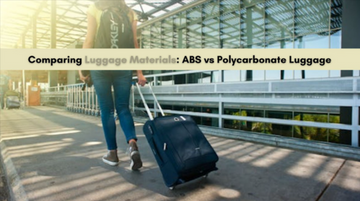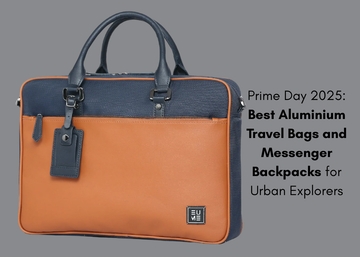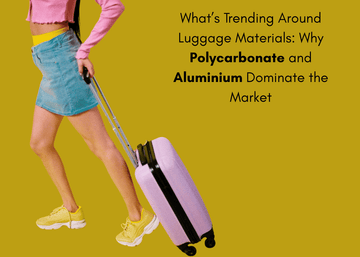When investing in new luggage, the material choice significantly impacts durability, weight, and value for money. Two popular materials dominate the market today: Polycarbonate and ABS. Let's explore their characteristics to help you make an informed decision.
Understanding Polycarbonate Luggage
Polycarbonate represents the premium choice in hardside luggage manufacturing. This high-performance thermoplastic offers exceptional strength and flexibility, making it ideal for frequent travelers.
Key Advantages of Polycarbonate
Polycarbonate's most notable feature is its superior impact resistance - it's more than twice as strong as ABS. This material can flex under pressure and return to its original shape, preventing permanent damage during rough handling. Its high impact resistance makes it a top choice for those seeking strong and durable luggage.
Weight and Maneuverability
Despite its robust construction, polycarbonate luggage remains remarkably lightweight. Typically, a polycarbonate carry-on weighs approximately 1kg less than its ABS counterpart - equivalent to the weight of 5-6 cotton T-shirts. This makes it easier to maneuver through airports and other travel hubs.
Scratch Resistance
Polycarbonate is also known for being scratch resistant, maintaining its aesthetic appeal even after multiple uses. This is a significant advantage over ABS, which is more prone to scratches.
Understanding ABS Luggage
ABS (Acrylonitrile Butadiene Styrene) represents the more economical option in hardside luggage. This thermoplastic polymer combines three materials to create a budget-friendly yet functional solution.
Strengths of ABS
The primary appeal of ABS lies in its affordability. It costs roughly half the price of polycarbonate to manufacture, making it an attractive option for budget-conscious travelers. However, it is not as durable as polycarbonate.
Limitations to Consider
While ABS offers decent durability, it lacks the flexibility of polycarbonate. Its rigid nature makes it more susceptible to cracking or breaking under pressure. Additionally, ABS shows vulnerability to UV radiation, potentially leading to discoloration over time.
Durability Face-Off
Impact Resistance
Polycarbonate demonstrates superior impact resistance and flexibility. When subjected to force, it can:
- Absorb shock effectively
- Return to its original shape
- Resist cracking under pressure
In contrast, ABS is more likely to sustain damage when exposed to similar conditions.
Weather Resistance
Polycarbonate shows excellent resistance to both heat and UV radiation, while ABS tends to degrade and yellow with prolonged sun exposure.
Price vs. Value Analysis
While ABS luggage typically ranges from $50-150, polycarbonate options generally fall between $200-400. However, the initial cost difference should be weighed against longevity and performance.
Long-term Investment
Polycarbonate luggage often proves more economical over time due to:
- Extended lifespan
- Better damage resistance
- Reduced replacement frequency
Best Use Cases
Polycarbonate Luggage Ideal For:
- Frequent travelers
- Long-haul flights
- Checked baggage
- Premium protection requirements
- Transporting fragile items
These features make polycarbonate an excellent choice for those who prioritize quality and durability in their travel gear.
ABS Luggage Suitable For:
- Occasional travelers
- Budget-conscious buyers
- Short trips
- Carry-on use
Despite its limitations, ABS remains a viable option for those who travel infrequently or are looking for a cost-effective solution.
Comparing Other Materials: Polypropylene vs Polycarbonate Luggage
When comparing polypropylene vs polycarbonate luggage, it's important to note that both materials offer unique benefits. Polypropylene is lighter and often cheaper than polycarbonate but lacks the same level of impact resistance and durability.
For further insights on this comparison, check out our detailed article on polypropylene vs polycarbonate luggage.
Making Your Choice
Consider your travel frequency, budget, and protection needs when selecting between these materials. While polycarbonate commands a higher initial investment, its superior durability and performance make it the preferred choice for regular travelers.
Explore More Options
For those interested in exploring different types of luggage materials beyond just polycarbonate and ABS:
- Check out our aluminium cabin luggage options for a blend of style and strength.
- Discover our range of travel luggage bags designed for all types of journeys.
- Explore our selection of cabin luggage bags perfect for short trips or business travel.
In conclusion, whether you choose polycarbonate vs abs, or even consider alternatives like polypropylene or aluminium, understanding your needs will guide you towards the best investment in your travel gear.
Frequently Asked Questions
Which is better for luggage, ABS or polycarbonate?
Polycarbonate is superior in terms of durability and impact resistance, though ABS offers better value for occasional travelers.
Is polycarbonate stronger than ABS plastic?
Yes, polycarbonate has over twice the impact strength of ABS plastic.
Is ABS ok for luggage?
Yes, ABS is suitable for occasional travel and offers adequate protection at a budget-friendly price point.
What material is best for checked luggage?
Polycarbonate is the best material for checked luggage due to its superior impact resistance and flexibility.
Which luggage material is the most durable?
Among common luggage materials, polycarbonate offers the highest durability, followed by ABS/PC composites, then ABS.



